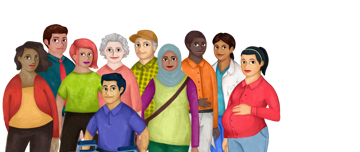
Participant responses will help researchers better understand the links between health conditions and mental illness
The National Institutes of Health’s All of Us Research Program has launched two new mental health and well-being surveys covering a range of behavioral and emotional health topics, including depression, anxiety, personality, self-harm, and others. Responses from participants will allow researchers to learn more about how mental health and well-being affect overall health. After completing the surveys, participants can choose to receive an immediate personality report based on their responses to one of the surveys.
“Mental and behavioral health conditions are influenced by many factors, including genetics, our experiences, and where we live,” said Holly A. Garriock, Ph.D., All of Us chief cohort development officer. “All of Us brings together data on each of these factors for researchers to help advance treatment, prevention, and diagnosis.”
Mental illnesses are among the most common health conditions in the United States, affecting more than one in five U.S. adults, according to the National Institute on Mental Health. More than 500,000 All of Us participants are eligible to respond to the surveys, which will be available in English and Spanish.
“The program designed the surveys to enable research on some of the most pressing mental health concerns and with a recognition that mental health is an essential component of overall health,” said Jordan W. Smoller, M.D., associate chief of research in the Department of Psychiatry at Massachusetts General Hospital. Dr. Smoller co-led the All of Us task force developing the surveys.
“Applying the framework of precision medicine to psychiatry can help us understand how our biology, our environment, and our genes impact our mental health,” Dr. Smoller said. “We want to address key unanswered questions about risk and resilience and move beyond the trial-and-error approach that, unfortunately, is still very much the practice.”
Participants can choose to skip any questions in the surveys that they don’t want to answer. Within sections addressing sensitive topics, participants are provided with crisis hotline support numbers and resources and encouraged to seek help if they need it. Before launching the surveys, All of Us provided several training sessions for staff helping participants complete the surveys. The trainings covered strategies for handling stress that could be triggered by the survey questions, and tips for sharing mental health resources.
The program has found previous survey data related to mental health to be of value to researchers. All of Us’ COVID-19 Participant Experience (COPE) survey was completed by more than 100,000 participants from May 2020 through February 2021, and included questions on COVID-19 symptoms and diagnoses, stress levels, social distancing, discrimination, and economic effects.
The COPE survey helped shed light on the impact of the pandemic. A September 2022 report, published in JAMA Psychiatry, tapped COPE data and found that high levels of everyday discrimination during the COVID-19 pandemic were strongly associated with moderate to severe depressive symptoms or suicidal thoughts. Another study, published in May of 2023 in Nature Mental Health, found that social support was associated with 55% lower odds of experiencing depression.
The new mental health and well-being surveys aim to provide additional data to advance research and discovery.
For more information about the All of Us Research Program, visit AllofUs.nih.gov.
All of Us, the All of Us logo, and “The Future of Health Begins with You” are service marks of the U.S. Department of Health and Human Services.
 U.S. Department of Health & Human Services
U.S. Department of Health & Human Services

